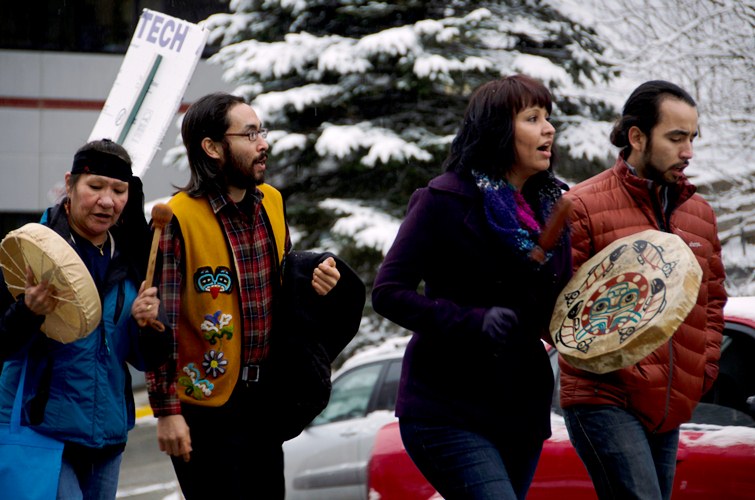Alaskans are joining the Canadian First Nations’ Idle No More movement.
Often compared to the “Occupy” protests, the grassroots movement has moved across Canada and is gaining traction among Native groups in the U.S.
Canadian First Nations are protesting legislation that removes environmental protections on tribal lands. As several First Nations’ chiefs were meeting with Canadian Prime Minister Stephen Harper on Friday, they got support in Juneau and Anchorage.
About a hundred people turned out for a noon rally in Anchorage, compared to about ten in Juneau, but the message and the signs were the same: Sustainability now; sovereignty for indigenous people.
At the Anchorage rally, Allison Warden, of Kaktovik, called the issues emotional.
“I hope something is awakened within you. Something inside your DNA, like this is where I’m supposed to be, this is what I’m supposed to do, this is how I stand up for my people,” Warden said.
Vi Waghiyi, of St. Lawrence Island, said the military bases built there during the 1950s have contaminated the land and waters where the Siberian Yupik residents of the island gather food:”
“We have 10 times more PCB levels in the blood of our people than the average American in the Lower 48. But we’re also some of the most highly contaminated population on the planet because of our reliance on our subsistence foods,” Waghiyi said. “Our very foods that have sustained our people for many, many generations are killing our people.”

In Juneau, Ishmael Hope called the Idle No More movement wholesome, simple and healing. Of Tlingit and Inupiat descent, Hope said the local rallies are not meant to antagonize.
“What we’re here to do is show who we are and that can translate into the politics of our time, and that can translate into the big issues of our time,” Hope said. “We could see how the clan, the language, our culture, our identity can connect with political issues, with ideas of sovereignty. “
Hope said the border between Alaska and Canada is invisible for Native people. And when it comes to major industrial development – like that proposed in the British Columbia wilderness – it could impact all Alaskans.
Guy Archibald is Mining and Clean Water Coordinator for the Southeast Alaska Conservation Council, which supports the Idle No More Movement.
“Up the Unik River, the Stikine River, the Sacred Headwaters, there’s huge open pit mines proposed mines proposed for up there,” he said. “The environmental review process of the Canadian federal government has been deregulated and defunded. It’s scary what could happen, and so much of our economy here in Southeast is dependent on these rivers. It’s a billion dollar fishing industry.”
While conservation groups share many of the values expressed in the Idle No More movement, Archibald said the cause should not be “co-opted by conservation groups.” He said Idle No More needs to remain an indigenous movement.
Related stories: Skiing the Sacred Headwaters; BC powerline spurs transboundary development
